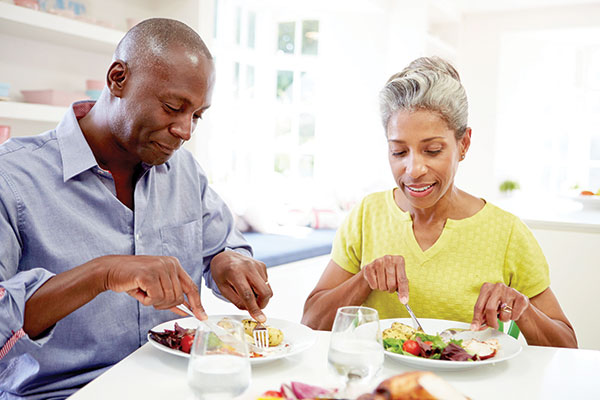The Dish on Good Nutrition
Healthy Eating Tips for Cancer Survivors
by Cara Anselmo, MS, RDN, CDN
Maintaining good nutrition during and after cancer treatment is essential for recovery. A healthy diet can help boost energy, manage body weight, reduce infection risk, and decrease treatment side effects. It also can (and should!) be a delicious part of your daily life.
While some basic nutrition guidelines are appropriate for almost everyone to follow, all bodies are different. Depending on your treatment, the type of cancer you have, and what your immediate and long-term goals are, your best approach to eating well might be very different from what is right for the person sitting next to you in the doctor’s office.
For most people, a primarily plant-based diet that includes a variety of whole vegetables and fruits, adequate protein, and healthy plant fats is ideal. Limit foods made from white flour or other refined grains, red and processed meats, and added sugars. Instead, reach for beans, nuts, whole grains (such as whole wheat and wild rice), and olive oil. Choose appropriate portions for all foods, and don’t overeat.
The Truth about Sugar
You may have heard the phrase “sugar feeds cancer.” It’s a hot topic, but it’s not the whole truth. Eating too much sugar – or too much food, period – can contribute to excess weight gain in the form of fat tissue. And we know that overweight and obesity are associated with increased cancer-related risks. So, it’s generally a good idea to limit added and refined sugars, like those in sodas, sweetened drinks, cakes, and even some flavored yogurts. But don’t worry about the sweetness you enjoy from a cup of melon or berries. And if you want to indulge in a cookie now and then, it’s OK. Moderation is more important than elimination.
Keeping Your Weight Up
If you’re struggling to keep weight on, or to regain weight lost during treatment, you will likely need to liberalize your diet. Try eating small, frequent meals and snacks made up of calorie-rich foods like avocado, pasta, coconut milk, and pasteurized cheese.
Certain dietary supplements can interfere with cancer treatments.
Water, Water Every Day
It’s important to stay well hydrated during treatment. Drinking enough water (usually about 1.5 to 2 liters daily) is the best natural “detox” there is. If getting enough to drink is difficult, try soups, broths, fresh or frozen fruits, flavored seltzer, mint tea, or adding sliced lemon to water. Just as you wouldn’t expect to get all your nutrients from only one meal, you should spread out your fluid intake and sip water throughout the day.
A Note on Supplements
In most cases, getting nutrients from whole foods is better for your body than taking dietary supplements. It is easily possible to consume excessive amounts of certain vitamins and minerals from supplement pills. In addition, certain dietary supplements can interfere with cancer treatments. Keep in mind, just because a product is labeled as “natural” doesn’t mean it is safe or effective. Always check with your dietitian or doctor if you are thinking about taking a dietary supplement.
Fix It with Food
Side effects can vary greatly from person to person and from treatment to treatment, so there is no one-size-fits all approach to managing them. However, eating (or avoiding) certain foods can help ease some of the side effects of cancer treatment. If you feel nauseated, ginger tea (hot or iced) and plain toast may be soothing. Avoid foods with strong odors, greasy foods, and very large meals. If you have mouth sores or a sore throat, try sipping cool, homemade smoothies or shakes through a straw. Avoid foods that are acidic, like orange juice and tomato sauce, or anything dry or harsh. For diarrhea, try mashed bananas, white rice, and plain yogurt.
Making It Easier to Eat Well
Have easy-to-prepare and easy-to-eat foods on hand, like individual yogurt cups, boxed soups, peanut butter and apples, and frozen vegetables. Recruit help from family and friends. Let them know what would be most beneficial to you, whether it’s your favorite take-away restaurant meal, a bag of fresh vegetables from the farmer’s market, or their company for dinner.
As with all things in life, try to focus on the big picture when it comes to eating well during cancer. Your health, quality of life, and joy all matter.

Cara Anselmo is an outpatient nutritionist at Memorial Sloan Kettering Cancer Center in New York, NY. She has worked in oncology nutrition since 2007. Cara is also a yoga instructor and has been teaching in New York City since 2007. Follow her on Twitter @caraanselmo.
This article was published in Coping® with Cancer magazine, July/August 2017.


